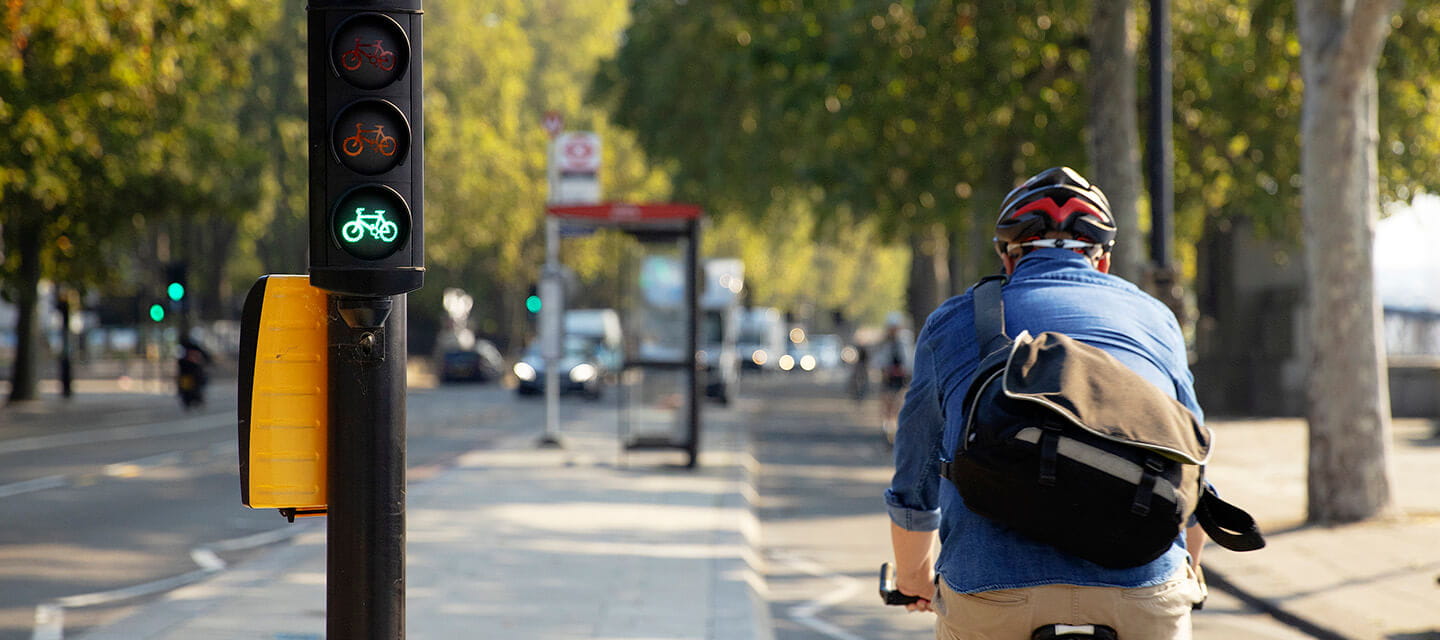

We all know that cycling offers numerous benefits for our physical and mental wellbeing, but are people over the age of 50 a generation of cycling fanatics, or should we encourage a newfound love for Lycra?
As part of our Cycling Cities campaign, we conducted research to determine the most cycle-friendly cities in the UK – and surveyed 2,000 adults from different generations to delve into their perspectives on cycling and gain a deeper understanding of their attitudes towards it.
It’s fair to say that historically, getting on a bike hasn’t exactly been second nature in UK towns, cities and villages.
In fact, data from Discerning Cyclist reveals that just 8% of the UK population cycles more than three times per week, compared to 90% of people in the Netherlands.
Even so, our survey revealed many cities across Britain have caught the biking bug. Using external data, we analysed the most populous UK cities and ranked them according to a range of factors, including:
Here are the cities that ranked the highest for their cycling experience.
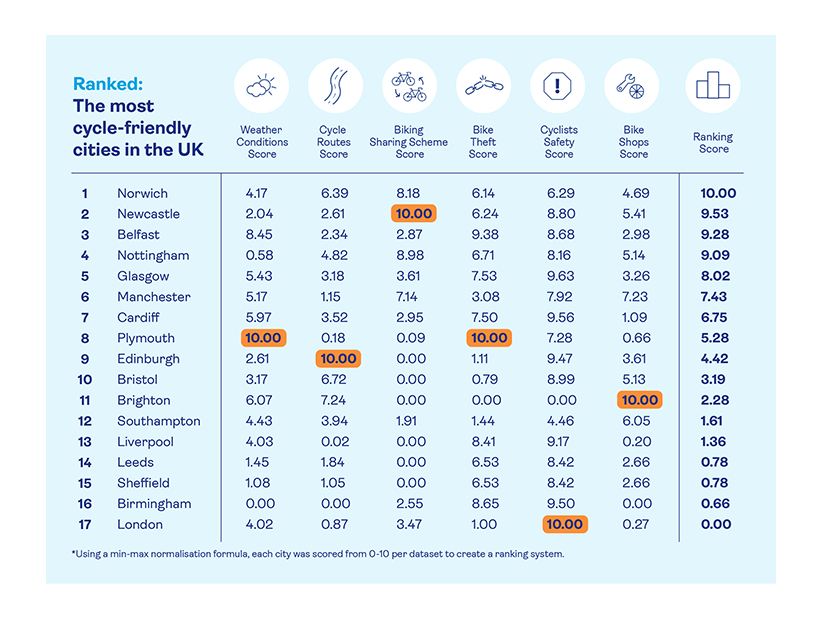
As our research uncovered, the East Anglian city of Norwich is ideally suited to cycling, and scored highly on factors like the availability of cycle routes, bike sharing schemes and temperate weather conditions. Norfolk as a whole is a relatively flat county, which makes cycling a breeze in low-lying areas.
Elsewhere, cities like Edinburgh achieved high marks for the number of cycle routes, but scored zero for the availability of hire bikes, after the Scottish capital’s bike sharing scheme was withdrawn in 2021. And while all those cobbles on the Royal Mile look beautiful, it’s perhaps not the best terrain for bikes!
Looking ahead, Manchester may have only reached sixth place in our table, but the city is currently investing £1.5bn in an ambitious Bee Network which aims to create 1,800 miles of cycling and walking routes by 2028.
Given that the UK government has set a target to double cycling activity by 2025, a new generation of commuters and leisure travellers could be inspired to get on their bike. And while Norwich tops our list of UK cycling cities, cycling infrastructure across the country could soon be catching up fast.
Despite there being an array of excellent cycle-friendly cities across the country – and an expanding network of routes – our survey painted a picture of a nation whose passion for pedalling has been held back.
So, what are the barriers to entry – and why are more individuals not taking advantage of cycling in these top cities?
To find out, we asked non-cyclists why they wouldn’t give two-wheeled transportation a try.

Understandably, safety is a concern for many people who are reluctant to ride. Cycling is hugely beneficial for our physical and mental health, so it’s important to consider the impact of safety concerns on our confidence and wellbeing.
As many Britons would like to cycle for work, leisure and exercise, perhaps it goes to show that measures like segregated cycle lanes would give people greater confidence and ultimately, better personal health.
Safety wasn’t the only cycling roadblock we uncovered. At a time when millions of households are feeling the pinch, 13% of respondents said the initial cost of a bike is a turnoff.
Money worries can have an impact on our health and wellbeing, but can cutting back on car usage save you money? To examine this, we asked cyclists how much they save each week compared to taking the train, bus or car.
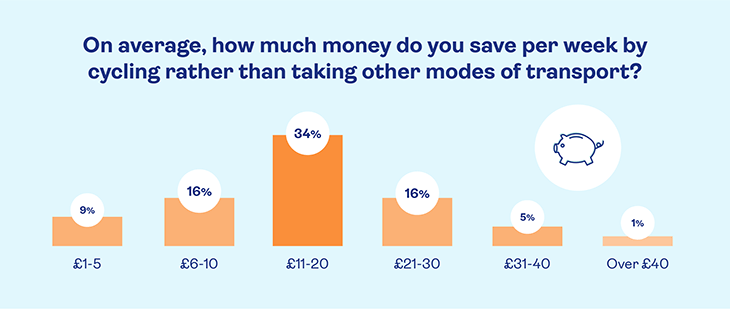
Given the growing cost of petrol and even charging an electric vehicle, life on two wheels could be increasingly appealing not just for our health but the bank balance too.
For millions of people, the COVID-19 pandemic transformed attitudes towards work, life and health habits – and cycling was no exception.
As the world stood still, cycling rates increased by 46% during the pandemic, reports GOV.UK. Transport habits may have changed overnight, but did the upheaval reset people’s attitudes towards two-wheeled travel?
We asked cyclists (those who cycle for exercise and transport) whether they’ve increased their cycling usage since the pandemic.
While a clear majority (72%) of cyclists told us they were cycling more or the same than pre-COVID, responses differed across the generations.
Just under a fifth (19%) of people aged over 50 said they were cycling less, compared to 30% of under 50s.
And opinions were split when it comes to people’s motivation for cycling. Those who said they cycle to keep fit were most likely to be from the youngest age category (35% of 18-24-year-olds) versus 15% of people aged 65-plus who said the same.
Although many cities are looking to make cycling more accessible, Britons of different ages had contrasting views on the quality of their local cycling network. For example, 66% of 18-24-year-olds agreed that their city is well equipped for cyclists, compared to 36% of 55-64-year-olds.
Additionally, 40% of Londoners strongly agree that their city has good public transport, compared to 20% across the UK as a whole.

While many Britons aren’t quite ready to ditch their vehicles for a ‘velo’, it appears the appetite for cycling remains strong – with respondents agreeing there are a whole host of benefits.
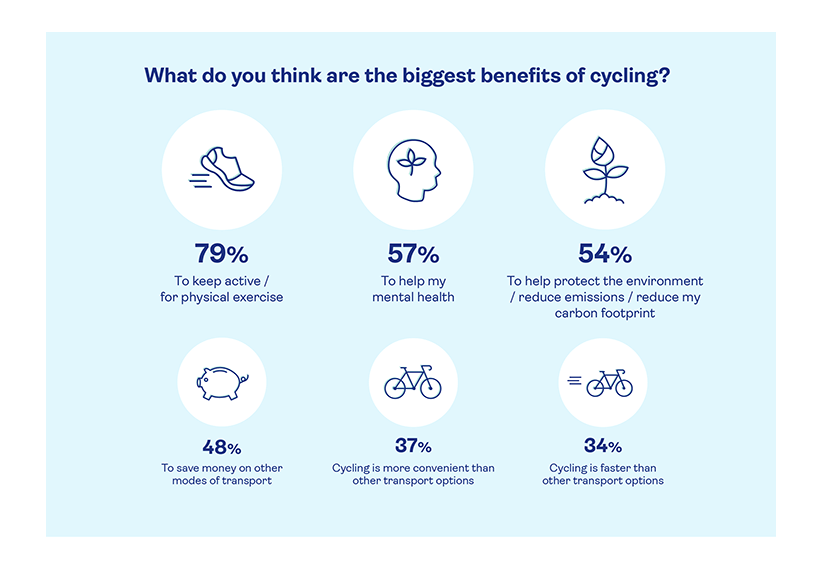
Even with the UK not being a cycling haven quite like the Netherlands just yet, our survey revealed an abundance of enthusiasm for two-wheeled travel across all age groups. But to truly unlock this passion, there are several steps to be made until everyone can access a top Cycling City on their doorstep.
Whether we enjoy whizzing through cities or admiring the views on a mountain trail, life on two wheels is great for our physical and mental health. Life’s too short to leave our most important health decisions to chance, but Saga Health Insurance could give you the confidence you need to enjoy your next adventure.
Saga Health Insurance is a unique product designed by us specifically for our customers and it is only available through us. Together with our underwriter, Bupa Insurance Limited, we are committed to providing high levels of quality, service and choice. That's why we offer a range of policies that can be tailored to suit your needs and budget.
Health insurance for people over 50 that provides a quicker route to diagnosis and planned medical treatment in a private hospital.


Get quicker diagnosis and treatment with nationwide private hospital options. There’s no upper age limit and you won’t need a medical.
There's plenty to explore and learn about our health insurance cover.

Health insurance gives you quick access to private healthcare for early diagnosis and prompt treatment.

Looking for private health insurance? Read out handy guide to choosing a healthcare provider.
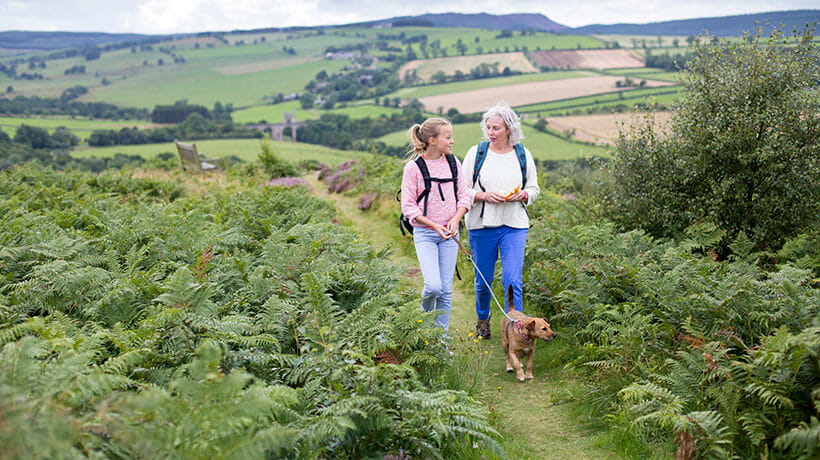
How can we rejuvenate our mental health and wellbeing as we get older? Our research suggests hobbies – and the natural world – hold the key.

We offer a choice of four health plans, each providing cover for diagnosis and prompt hospital treatment.

Tailor and improve your Saga Health Insurance policy so you can have the cover that's right for you.

It's easy to switch your health insurance to Saga or set up a policy after a company scheme has ended.

Learn more about the three different underwriting methods in a Saga HealthPlan including Moratorium and Full Medical Underwriting.

One of the main benefits of Saga Health Insurance is choosing where you're treated, from a range of private hospitals.

Want to know more? Here are the answers to the questions we're asked most often about our health insurance.

Our glossary of health insurance terms explains the most commonly used words and phrases to make things as clear as possible.

The Saga GP Service offers unlimited access to telephone GP appointments – 24 hours a day, 365 days a year.

Visit our membership handbook page for useful information on making a claim, including how and when to contact us.

Saga HealthPlans, Super, Secure and Saver Plus all provide the peace of mind that you have access to good, all-round cover for cancer every step of the way.